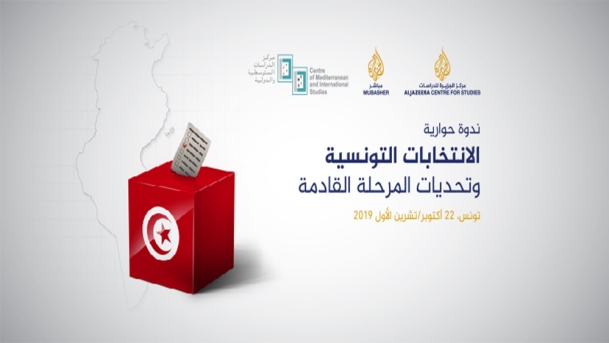
Al Jazeera Centre for Studies (AJCS) and the Centre of Mediterranean and International Studies (Centre des Etudes Méditerranéennes et Internationales; CEMI) are hosting a seminar “The Tunisian Elections and the Challenges of the Next Era”, in collaboration with Al Jazeera Mubasher on Tuesday, 22 October 2019, in Tunis.
The seminar discussion will examine the results of the 2019 legislative and presidential elections, in which the Ennahda Party came first and the Qalb Tounes party second. Kais Saied was elected president after facing his rival after Nabil Karoui in the second round of ballots held October 13. A number of local and international experts and analysts will debate potential parliamentary alliances and the prospects of forming a government among rival parties, at this conjuncture of a democratization process that was sparked by the country’s “Jasmine Revolution” in December 2010. The recently held legislative and presidential elections resulted in a complex political shift in the context of has been termed as “punitive voting”, which has undermined the political potential of the Ruling Coalition parties especially between Ennahda and Nidaa Tunis, as well as some components of the traditional opposition.
The symposium will probe also into the complexity of rapprochement between the ideologically-distant parties and their inability to get a sufficient number of seats to enable them to form a government on their own or through simple alliances. Subsequently, the parliamentary scene shifts between centrist blocs and smaller blocs in addition to the large number of independent deputies of parliament. This political divergence will minimize the chances of parliamentary consensus, which is required for taking legislative action. The symposium’s concept note does not assert the impossibility of a consensus on a non-partisan national unity government. In fact, it argues that it is possible since instability benefits no one; and all parties will bear the exorbitant political costs.
Tunisia’ Electoral Commission announced that former law professor Kais Saied secured 73% of votes in the run-off election and 55% of those registered to vote casted their ballots October 13. On week earlier, the Commission announced the official results of the legislative elections; Ennahda Party came in first with 52 seats of 217 seats, followed by Qalb Tounes led by Karoui with 38 seats with a voter turnout that exceeded 41%. The Democratic Current won 22 seats, the Karama Coalition 21 seats, the Constitutional Liberal Party 17 seats, the People’s Movement 16 seats, and Long Live Tunisia led by Youssef Chahed 14 seats. Securing a parliamentary majority and forming a new government requires a coalition of 109 deputies of parliament, which is difficult to achieve in light of the dominant polarisations of Tunisian politics.